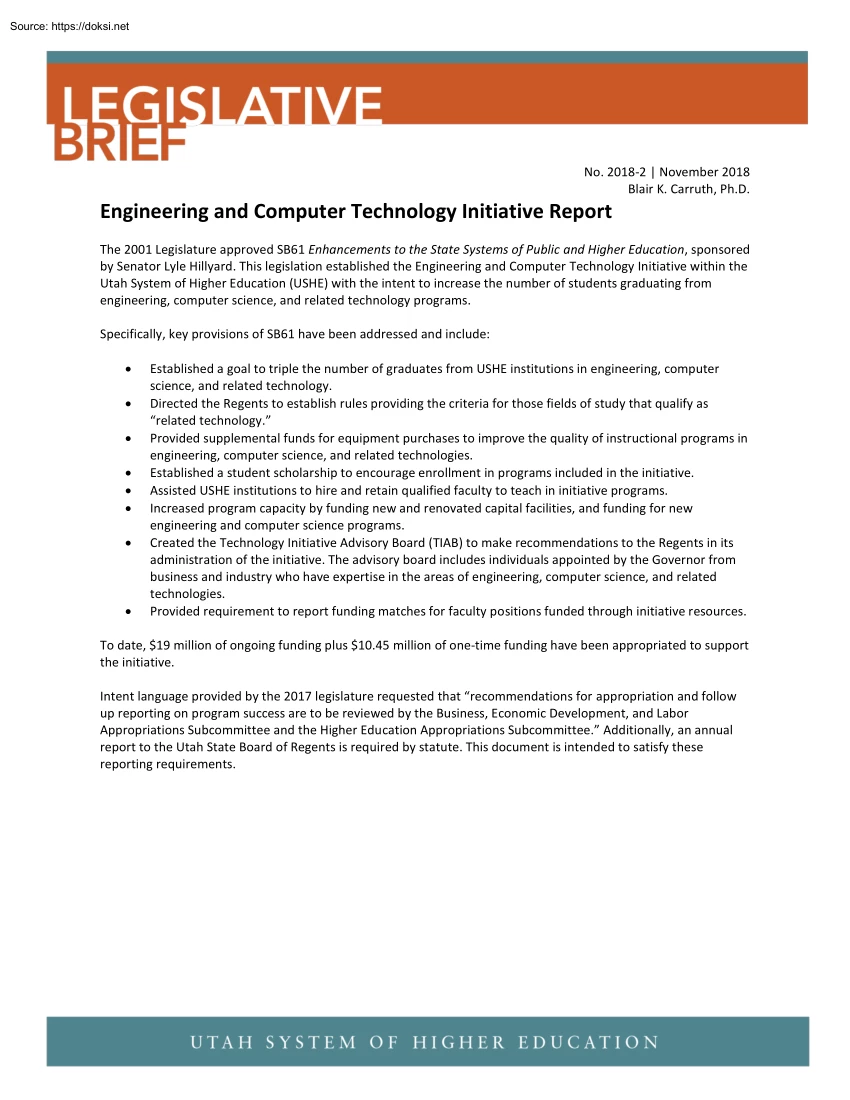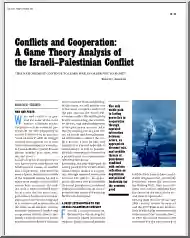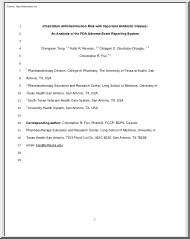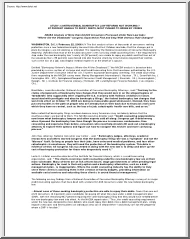Please log in to read this in our online viewer!

Please log in to read this in our online viewer!
No comments yet. You can be the first!
What did others read after this?
Content extract
No. 2018-2 | November 2018 Blair K. Carruth, PhD Engineering and Computer Technology Initiative Report The 2001 Legislature approved SB61 Enhancements to the State Systems of Public and Higher Education, sponsored by Senator Lyle Hillyard. This legislation established the Engineering and Computer Technology Initiative within the Utah System of Higher Education (USHE) with the intent to increase the number of students graduating from engineering, computer science, and related technology programs. Specifically, key provisions of SB61 have been addressed and include: Established a goal to triple the number of graduates from USHE institutions in engineering, computer science, and related technology. Directed the Regents to establish rules providing the criteria for those fields of study that qualify as “related technology.” Provided supplemental funds for equipment purchases to improve the quality of instructional programs in engineering, computer
science, and related technologies. Established a student scholarship to encourage enrollment in programs included in the initiative. Assisted USHE institutions to hire and retain qualified faculty to teach in initiative programs. Increased program capacity by funding new and renovated capital facilities, and funding for new engineering and computer science programs. Created the Technology Initiative Advisory Board (TIAB) to make recommendations to the Regents in its administration of the initiative. The advisory board includes individuals appointed by the Governor from business and industry who have expertise in the areas of engineering, computer science, and related technologies. Provided requirement to report funding matches for faculty positions funded through initiative resources. To date, $19 million of ongoing funding plus $10.45 million of one-time funding have been appropriated to support the initiative. Intent language provided by the 2017 legislature requested that
“recommendations for appropriation and follow up reporting on program success are to be reviewed by the Business, Economic Development, and Labor Appropriations Subcommittee and the Higher Education Appropriations Subcommittee.” Additionally, an annual report to the Utah State Board of Regents is required by statute. This document is intended to satisfy these reporting requirements. Legislative Brief No. 2018-2 | November 2018 Appropriated Funds The following table summarizes funding appropriated to the initiative between FY2002 and FY2019. Engineering and Computer Science Initiative Funding History 2002-2016 Year 2001-02 2002-03 2003-04 2004-05 2005-06 2006-07 2007-08 2008-09 2009-10 2010-11 2011-12 2012-13 2013-14 2014-15 2015-16 2016-17 2017-18 2018-19 Total Ongoing $1,000,000 $2,000,000 $500,000 $500,000 $1,500,000 $500,000 $3,000,000 $0 $0 $0 $0 $2,500,000 $0 $0 $3,500,000 $0 $4,000,000 $0 $19,000,000 Funds Appropriated One time $2,500,000 $1,000,000 $0 $500,000
$500,000 $700,000 $2,000,000 $250,000 $2,000,000 $0 $0 $0 $0 $0 $1,000,000 $0 $0 $0 $10,450,000 Scholarship1 $500,000 $0 $50,000 $0 $0 $0 $0 $0 $0 $0 $0 $0 $0 $0 $0 $0 $0 $0 $550,000 Degree Completion Results Although the initiative has been underway since 2001, base year comparisons measured graduation counts since FY2016, the last year data were used to determine the most recent appropriation as provided by the 2017 Legislature. Total Comparison of Degree Completions for the Engineering and Computer Science Initiative FY2016 (Base Year) FY2018 Change from FY2016 to FY2018 CS Eng Total CS Eng Total Change Percent Change 1,312 1,626 2,938 1,553 1,730 3,283 345 11.74 1 In 2001, SB61 established a loan forgiveness fund to assist students in obtaining degrees in engineering and computer science. In 2009, SB105 changed the loan forgiveness program to a scholarship program for the purpose of recruiting, retaining, and training engineering and computer science and related technology
students. At that time scholarship funding was $39,200 annually. In FY13 an additional $300,000 of ongoing scholarship funding was allocated to institutions by the Board of Regents from the FY13 $2,500,000 appropriation. This $300,000 of scholarship funding did not roll into the previously legislated scholarship funding program but went directly to institutions. 2 Legislative Brief No. 2018-2 | November 2018 Over the life of the initiative, there has been a significant impact on degrees awarded in engineering and computer science. The 1,730 engineering degrees awarded in FY2018 is double the 862 engineering degrees awarded in FY2000, and the 1,553 computer science degrees awarded in FY2018 is triple the 513 computer science degrees awarded in FY2000. Over time there has been a consistent increase in total number of degrees awarded in the targeted areas. Since the initiative began, a total of 38,911 computer science and engineering degrees have been awarded. The initiative has
resulted in a positive cumulative impact for the state It is believed that this targeted investment has made a significant difference for Utah. The TIAB will use information provided in this report to determine possible future requests for legislative funding and to recommend allocation of any additional funding received in accordance with legislative intent that specifies funds should be allocated based on graduation increases in targeted areas and in high demand occupations. Matching Funds Utah Code 53B-6-105.9 requires institutions to match ongoing funds appropriated to the initiative that are used for faculty positions. Beginning with funding appropriated for FY2013, institutions have submitted reports that demonstrate compliance with the matching requirement. Based on information from these reports, the ongoing appropriations awarded in FY2013, FY2016, and FY2018 were matched by the USHE institutions. The following tables provide matching funds information by institution.
Institution University of Utah Utah State University Weber State University Southern Utah University* Snow College Dixie State University Utah Valley University Salt Lake Community College Institution University of Utah Matching Funds Report- Summary FY2013 Ongoing FY 2016 Ongoing Appropriations Matched by Appropriations Matched Institutions by Institutions $600,000 $1,217,809 $270,000 $515,000 FY 2018 Ongoing Appropriations Matched by Institutions $1,540,000 $900,000 $88,000 $440,000 $840,000 Did not receive funding in FY2013 Did not receive funding in FY2013 Did not receive funding in FY2013 $370,000 Did not receive funding for faculty positions in FY2016 $113,000 $60,000 $175,000 $60,000 $375,000 $480,000 $72,000 $57,000 $60,000 Matching Funds Detail for FY2018 Faculty Type Department Appropriated 2 Faculty 1 Faculty 2 Faculty 3 Faculty Bioengineering Chemical Engineering Civil Engineering Electrical Engineering $60,000 Match Total $121,500 $62,500 $121,500
$62,500 $243,000 $125,000 $119,875 $195,225 $119,875 $195,225 $239,750 $390,450 3 Legislative Brief No. 2018-2 | November 2018 5 Faculty 11 Faculty Support Total Utah State University Total Weber State University 2 Assistant Professors 3 Professors of Practice 2 Assistant Professors 4 Assistant Professors 3 Assistant Professors Assistant Professor of Practice Civil Engineering Assistant Professor 3 Instructors School of Computing School of Computing Searches for new faculty to start FY2019 To be hired Total Southern Utah University Total Snow College Total Dixie State University Total Utah Valley University Total Mechanical Engineering School of Computing College of Engineering Computer Science Computer Science Electrical Engineering Mechanical Engineering Mechanical Engineering Assistant Professor Engineering & Technology Instructor Software Engineering Assistant Professor Mechanical Engineering Assistant Professor Assistant Professor 2 Assistant
Professors Assistant Professor Assistant Professor 2 Lecturers Electrical Engineering Mechanical Engineering Civil Engineering $311,500 $311,500 $623,000 $717,500 $717,500 $1,435,000 $11,900 $11,900 $23,800 $1,540,000 $121,910 $1,540,000 $121,910 $3,080,000 $243,820 $158,264 $158,264 $316,528 $127,020 $127,020 $254,040 $247,161 $247,161 $494,322 $190,895 $190,895 $381,790 $54,750 $54,750 $109,500 $900,000 $54,340 $900,000 $54,340 $1,800,000 $108,680 $140,855 $140, 855 $281,710 $644,805 $644,805 $1,289,610 $840,000 $60,000 $840,000 $60,000 $1,680,000 $120,000 $60,000 $60,000 $60,000 $60,000 $120,000 $120,000 $60,000 $60,000 $60,000 $60,000 $120,000 $120,000 $60,000 $120,000 $60,000 $120,000 $120,000 $120,000 $120,000 $240,000 $240,000 Master Computer Science Master Cybersecurity Computer Science $480,000 $127,000 $127,000 $153,000 $153,000 $200,000 $200,000 $480,000 $960,000 4 Legislative Brief No. 2018-2 | November 2018
Salt Lake Community College Assistant Professor Total USHE Total Computer Science $60,000 $60,000 $120,000 $60,000 $4,000,000 $60,000 $4,000,000 $120,000 $8,000,000 TIAB Membership John Sutherland (Chair) Susan Johnson (Co-Chair) Reed Brown Vance Checketts Roland Christensen Ed Ekstrom Ed Esper Mark Ripke Chuck Taylor J. Howard VanBoerum Brigham Young University Futura Industries (Retired) Mathnasium Dsco.io Applied Composite Technology Tallcastle Capital Utah Capital Investment Corporation Boeing SyberJet Aircraft VanBoerum & Frank 5
science, and related technologies. Established a student scholarship to encourage enrollment in programs included in the initiative. Assisted USHE institutions to hire and retain qualified faculty to teach in initiative programs. Increased program capacity by funding new and renovated capital facilities, and funding for new engineering and computer science programs. Created the Technology Initiative Advisory Board (TIAB) to make recommendations to the Regents in its administration of the initiative. The advisory board includes individuals appointed by the Governor from business and industry who have expertise in the areas of engineering, computer science, and related technologies. Provided requirement to report funding matches for faculty positions funded through initiative resources. To date, $19 million of ongoing funding plus $10.45 million of one-time funding have been appropriated to support the initiative. Intent language provided by the 2017 legislature requested that
“recommendations for appropriation and follow up reporting on program success are to be reviewed by the Business, Economic Development, and Labor Appropriations Subcommittee and the Higher Education Appropriations Subcommittee.” Additionally, an annual report to the Utah State Board of Regents is required by statute. This document is intended to satisfy these reporting requirements. Legislative Brief No. 2018-2 | November 2018 Appropriated Funds The following table summarizes funding appropriated to the initiative between FY2002 and FY2019. Engineering and Computer Science Initiative Funding History 2002-2016 Year 2001-02 2002-03 2003-04 2004-05 2005-06 2006-07 2007-08 2008-09 2009-10 2010-11 2011-12 2012-13 2013-14 2014-15 2015-16 2016-17 2017-18 2018-19 Total Ongoing $1,000,000 $2,000,000 $500,000 $500,000 $1,500,000 $500,000 $3,000,000 $0 $0 $0 $0 $2,500,000 $0 $0 $3,500,000 $0 $4,000,000 $0 $19,000,000 Funds Appropriated One time $2,500,000 $1,000,000 $0 $500,000
$500,000 $700,000 $2,000,000 $250,000 $2,000,000 $0 $0 $0 $0 $0 $1,000,000 $0 $0 $0 $10,450,000 Scholarship1 $500,000 $0 $50,000 $0 $0 $0 $0 $0 $0 $0 $0 $0 $0 $0 $0 $0 $0 $0 $550,000 Degree Completion Results Although the initiative has been underway since 2001, base year comparisons measured graduation counts since FY2016, the last year data were used to determine the most recent appropriation as provided by the 2017 Legislature. Total Comparison of Degree Completions for the Engineering and Computer Science Initiative FY2016 (Base Year) FY2018 Change from FY2016 to FY2018 CS Eng Total CS Eng Total Change Percent Change 1,312 1,626 2,938 1,553 1,730 3,283 345 11.74 1 In 2001, SB61 established a loan forgiveness fund to assist students in obtaining degrees in engineering and computer science. In 2009, SB105 changed the loan forgiveness program to a scholarship program for the purpose of recruiting, retaining, and training engineering and computer science and related technology
students. At that time scholarship funding was $39,200 annually. In FY13 an additional $300,000 of ongoing scholarship funding was allocated to institutions by the Board of Regents from the FY13 $2,500,000 appropriation. This $300,000 of scholarship funding did not roll into the previously legislated scholarship funding program but went directly to institutions. 2 Legislative Brief No. 2018-2 | November 2018 Over the life of the initiative, there has been a significant impact on degrees awarded in engineering and computer science. The 1,730 engineering degrees awarded in FY2018 is double the 862 engineering degrees awarded in FY2000, and the 1,553 computer science degrees awarded in FY2018 is triple the 513 computer science degrees awarded in FY2000. Over time there has been a consistent increase in total number of degrees awarded in the targeted areas. Since the initiative began, a total of 38,911 computer science and engineering degrees have been awarded. The initiative has
resulted in a positive cumulative impact for the state It is believed that this targeted investment has made a significant difference for Utah. The TIAB will use information provided in this report to determine possible future requests for legislative funding and to recommend allocation of any additional funding received in accordance with legislative intent that specifies funds should be allocated based on graduation increases in targeted areas and in high demand occupations. Matching Funds Utah Code 53B-6-105.9 requires institutions to match ongoing funds appropriated to the initiative that are used for faculty positions. Beginning with funding appropriated for FY2013, institutions have submitted reports that demonstrate compliance with the matching requirement. Based on information from these reports, the ongoing appropriations awarded in FY2013, FY2016, and FY2018 were matched by the USHE institutions. The following tables provide matching funds information by institution.
Institution University of Utah Utah State University Weber State University Southern Utah University* Snow College Dixie State University Utah Valley University Salt Lake Community College Institution University of Utah Matching Funds Report- Summary FY2013 Ongoing FY 2016 Ongoing Appropriations Matched by Appropriations Matched Institutions by Institutions $600,000 $1,217,809 $270,000 $515,000 FY 2018 Ongoing Appropriations Matched by Institutions $1,540,000 $900,000 $88,000 $440,000 $840,000 Did not receive funding in FY2013 Did not receive funding in FY2013 Did not receive funding in FY2013 $370,000 Did not receive funding for faculty positions in FY2016 $113,000 $60,000 $175,000 $60,000 $375,000 $480,000 $72,000 $57,000 $60,000 Matching Funds Detail for FY2018 Faculty Type Department Appropriated 2 Faculty 1 Faculty 2 Faculty 3 Faculty Bioengineering Chemical Engineering Civil Engineering Electrical Engineering $60,000 Match Total $121,500 $62,500 $121,500
$62,500 $243,000 $125,000 $119,875 $195,225 $119,875 $195,225 $239,750 $390,450 3 Legislative Brief No. 2018-2 | November 2018 5 Faculty 11 Faculty Support Total Utah State University Total Weber State University 2 Assistant Professors 3 Professors of Practice 2 Assistant Professors 4 Assistant Professors 3 Assistant Professors Assistant Professor of Practice Civil Engineering Assistant Professor 3 Instructors School of Computing School of Computing Searches for new faculty to start FY2019 To be hired Total Southern Utah University Total Snow College Total Dixie State University Total Utah Valley University Total Mechanical Engineering School of Computing College of Engineering Computer Science Computer Science Electrical Engineering Mechanical Engineering Mechanical Engineering Assistant Professor Engineering & Technology Instructor Software Engineering Assistant Professor Mechanical Engineering Assistant Professor Assistant Professor 2 Assistant
Professors Assistant Professor Assistant Professor 2 Lecturers Electrical Engineering Mechanical Engineering Civil Engineering $311,500 $311,500 $623,000 $717,500 $717,500 $1,435,000 $11,900 $11,900 $23,800 $1,540,000 $121,910 $1,540,000 $121,910 $3,080,000 $243,820 $158,264 $158,264 $316,528 $127,020 $127,020 $254,040 $247,161 $247,161 $494,322 $190,895 $190,895 $381,790 $54,750 $54,750 $109,500 $900,000 $54,340 $900,000 $54,340 $1,800,000 $108,680 $140,855 $140, 855 $281,710 $644,805 $644,805 $1,289,610 $840,000 $60,000 $840,000 $60,000 $1,680,000 $120,000 $60,000 $60,000 $60,000 $60,000 $120,000 $120,000 $60,000 $60,000 $60,000 $60,000 $120,000 $120,000 $60,000 $120,000 $60,000 $120,000 $120,000 $120,000 $120,000 $240,000 $240,000 Master Computer Science Master Cybersecurity Computer Science $480,000 $127,000 $127,000 $153,000 $153,000 $200,000 $200,000 $480,000 $960,000 4 Legislative Brief No. 2018-2 | November 2018
Salt Lake Community College Assistant Professor Total USHE Total Computer Science $60,000 $60,000 $120,000 $60,000 $4,000,000 $60,000 $4,000,000 $120,000 $8,000,000 TIAB Membership John Sutherland (Chair) Susan Johnson (Co-Chair) Reed Brown Vance Checketts Roland Christensen Ed Ekstrom Ed Esper Mark Ripke Chuck Taylor J. Howard VanBoerum Brigham Young University Futura Industries (Retired) Mathnasium Dsco.io Applied Composite Technology Tallcastle Capital Utah Capital Investment Corporation Boeing SyberJet Aircraft VanBoerum & Frank 5




